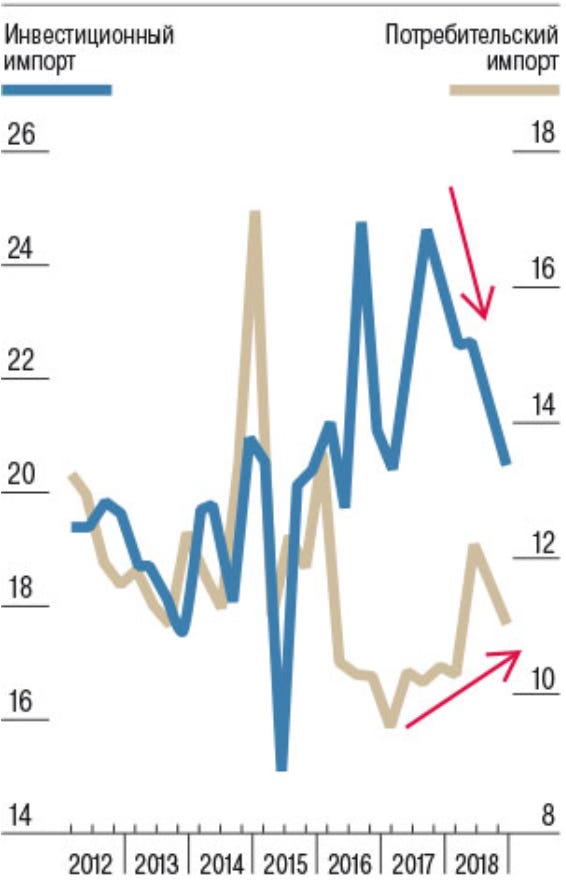Gryaz You Like It

HAPPENING TODAY
Environmental damage payments decrease — Medvedev looks to soften currency controls — and Medvedev backs digital marking for dairy products.
Markets
USD to RUB: 64.2975 (.55%)
BRENT CRUDE: 66.80 (.34%)
IMOEX: 2492.17 (.02%)
RTS: 1221.99 (.71%)
Regulation
Environmental damage payments decrease
NEWS: Non-tax payments for damaging the environment have decreased from 30 billion rubles ($470 million) in 2013 to 13 billion ($200 million) rubles last year. Revenue from payments is shared between the federal (5%), regional (40%) and local (55%) budgets.
ANALYSIS: This is another example of how reform in the center can hurt regions’ bottom lines. The central government recognizes the need for a better incentive system to prevent pollution and encourage investment. Companies take advantage of the confusion to dramatically lower their payments or stop paying at all. This deprives regional and local governments of much-needed revenue — without reducing pollution at all. Call it regulatory confusion or a partial reform equilibrium, but this situation looks worryingly similar to several of the May decree initiatives.
CONTEXT:
In 2014, the government undertook a reform that made it easier for companies to avoid paying the environmental damage fee. There is still uncertainty, however, about whether the payment will be added to the Tax Code.
Rosstat reports that payments have decreased, at the same time as instances of environmental damage are increasing.
Most companies have paid reduced amounts in environmental damage fees. Others have stopped paying entirely, citing new allowances for overpayments in previous periods and environmental programs that offset the damage directly.

Snapshot: Dmitry Bosov asks Putin for a favor [RUS]
Dmitry Bosov, co-owner of Sibantratsit and Vostokuglya, reportedly wrote to Putin requesting his firms have privileged access to the Trans-Siberian and Baikal-Amur Mainline routes for 25 years to ship up to 50 million tons annually. (Photo: Yevgeniy Razumny / Vedomosti)
Capital controls
Medvedev looks to soften currency controls
NEWS: PM Dmitry Medvedev has instructed the ministries to promptly submit a bill to the government that will potentially abolish criminal punishment for the non-repatriation of foreign currency (FX) earnings.
TAKEAWAY: Russian exporters have a lot of gripes about mandatory repatriation laws, arguing that the requirement forces them to jack up prices for exported goods and that the risk of criminal punishment prevents companies from entering foreign markets altogether. Officials are coming around to the fact that currency controls need to be amended. Last year, the government ruled that sanctioned companies no longer need to repatriate FX earnings. MinFin and the Bank of Russia further agreed to reduce fines and gradually abolish the mandatory repatriation of raw material exporters’ ruble earnings. Real change is slow, however, and while it is easy for the government to amend currency controls to advance geopolitical interests—aiding sanctioned companies and promoting the use of the ruble in commodities exports—don’t expect a complete overhaul anytime soon.
CONTEXT:
Currently, exporters are obligated to repatriate both ruble and foreign exchange proceeds into a Russian bank account. For each day of delay, companies are penalized 1/150 of the central bank’s key interest rate times the unreturned amount.
If a company fails to repatriate the funds, it faces a penalty of 75-100% of the unreturned amount and five years in prison.
Last week, four business associations—the Russian Union of Industrialists and Entrepreneurs, the Chamber of Commerce and Industry, Delovaya Rossiya, and Opora Rossii—sent Medvedev a letter asking him to repeal criminal liability for the non-repatriation of FX earnings.
What They're Saying
"Dmitry Rogozin's position should be renamed. 'General director' is a formulation made up of non-Russian words."
- Vladimir Zhirinovsky, on speaking truth to power
Chart: Capital imports still dropping from 2018 [RUS]
Title: Share of capital and consumer imports (% total imports)
Blue: Capital imports
Tan: Consumer imports

Regulations
Medvedev backs digital marking for dairy products
NEWS: Medvedev reportedly supports the integration of digital marking initiatives for dairy products with the "Mercury" system, a concrete resolution to a fight that has persisted for a year now.
TAKEAWAY: This matters a great deal for Belarus-Russia ties. Last year's dairy fights developed out of complaints made by Russian businesses through the EAEU, and a unified marking system for quality controls will likely slowly force compliance in other member states to maintain supply chains. It's not a high-profile topic, but it's telling that Medvedev is trying to finalize a solution a year after the issue was first raised. They need to set clear rules for businesses ASAP.
CONTEXT:
The broader support for Medvedev's proposal is unclear as Vedomosti only cites one unnamed official close to talks from within the government and representatives from MinPromtorg and Alexei Gordeev (who handles agriculture) refused to comment.
Rosselkhoznadzor cites figures that up to 23% of all dairy products falsify their quality ratings, whether that be through illegal imports or else lying to inspectors and consumers.
The Mercury system is already used for animal products but MinEkonomrazvitiya opposed the broader use of the system. MinSelkhoz proposed using Mercury, but phasing it in slowly in steps starting 1 July, 2019 for different product segments.
Danone and PepsiCo are reportedly against the introduction of Mercury, which suggests that the initiative will be used to privilege large domestic producers and raise the costs of market access and compliance.
OTHER STORIES
Johny Comms Lately: MinKomSvyaz is requesting a legal simplification for internet providers to be able to access residential buildings without negotiating through companies held by MinStroy.
Car Talk: Consumers are taking out more loans to purchase automobiles are rising despite declining demand thanks to stagnate wages.
As Told By [a] Ginger: Elvira Nabiullina says that despite lower than expected inflationary effects from the VAT hike, producers are struggling to maintain their market share and profits based on margins due to inventories produced prior to the VAT hike and changes on the market.
OPINION / ANALYSIS
Andrew Higgins argues in the New York Times that Russia is not a “properly run dictatorship.” The gulf between what Putin says and what his underlings do is sizable. [ENG]
From Riddle: Andrei Zakharov and Leonid Isaev compare the “monarchial presidencies” of Russia and Algeria, noting that Bouteflika’s experience is instructive for the Kremlin. [ENG]
Economist Pavel Aptekar explains in Vedomosti why poverty in Russia is declining so slowly. There is little upside for the poor without broader economic growth. [RUS]
The New York Times offers a lovely feature (with spectacular photos) of the ice marathon across Lake Baikal. Be sure to check it out! [ENG]

Founded in 1955, the Foreign Policy Research Institute is dedicated to bringing the insights of scholarship to bear on the foreign policy and national security challenges facing the United States. It seeks to educate the public, teach teachers, train students, and offer ideas to advance U.S. national interests based on a nonpartisan, geopolitical perspective that illuminates contemporary international affairs through the lens of history, geography, and culture.
To keep up with FPRI daily, be sure to follow us on Twitter @FPRI and Like us on Facebook — joining our more than 250,000 fans worldwide!
For more information, contact Eli Gilman at 215-732-3774, ext. 103, email fpri@fpri.org, or visit us at www.fpri.org.




